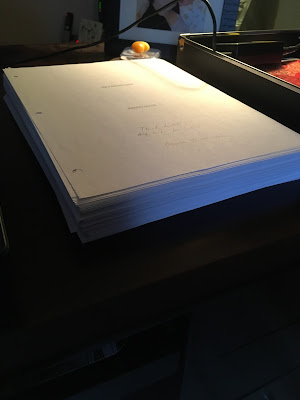For me, that's about right.
Of course, my first drafts are all about laying the groundwork; my first drafts are barebones. The subsequent drafts are when I focus on building the world around the frame I've constructed, honing the balance between what's necessary for you to know, and what gets the point across. My goal, by the time I finish my fourth draft, is to give you, dear reader, a seamless film in your head to imagine while you're reading that moves along at a steady pace, paints a beautiful picture that's framed with precise composition, and, equally as important, doesn't overwhelm you in minutiae. If I dedicate more than ten words about a rocking chair then that chair is significant (or just a red herring), otherwise I won't bother. A reader doesn't need to know, or be told, everything.
And yet, for those who have never looked into the word count of their favorite books, 62,000 words is relatively short for a novel. Novels are defined (and this is depending on where you look; I'm gathering from a few general sources here) as being, typically, between 40,000 and 120,000 words. But there's a lot of wiggle room, especially toward the far side of that spectrum. There are also a lot of factors that are included in those longer word counts, like genre, subplots, the inclusion of side characters, or shifting POV to other main characters, etc. It depends a lot on the author and their style. My favorite author is Stephen King, and maybe only one or two of his books are anywhere near that 40,000 word count bookend (Carrie, one of his shortest novels, is somewhere around 63k); many of his works reside in the 200,000 range (like Bag of Bones). His novel, The Girl Who Loved Tom Gordon, one of my favorites, is shorter than his typical fare (around 60k), but also focuses primarily with a single character, whereas Mr. Mercedes (around 130k) alternates between telling the story from the view of the protagonist, Bill Hodges, and antagonist, Brady Hartsfield.
What does the amount of words in a story mean in the grand scheme of things? Not a whole lot, really. I admit, I'm one of those writers who's obsessed with word count. It bothers me though. I hate that it creeps into my mind when I'm telling a story, because the amount of words I use is the last thing that should concern me, rather than how I'm using the words I'm using, and why. But it does. I suppose it's because I want to give the reader as much as I can, and not have them feel slighted - give them their money's worth. Give them a place they can lose themselves for a while and concern them with a fictional character's plight rather than anything going on in their own lives. And I know that's easier with a denser book.
As it is, I know my pacing, my style, and I know my inclination (and comfort) to focus my stories from the point of view of a single protagonist and put them through the ringer with a sprinkling of side characters who join the fray. My stories are smaller, intimate, closed off. I also know a longer book doesn't necessarily make a better one. Ray Bradbury's Fahrenheit 451 is considered one of the best novels ever written and it's only about 45k words. My own personal favorite book, A Monster Calls (by Patrick Ness) is only 35k long.
Perhaps someday I'll write that sprawling novel that shifts points of view, balancing numerous main characters and subplots. I know I want to. I have the ideas for it.
As an interesting comparison in closing (and because I thought it made a cool visual), below are two pictures of completed manuscripts. The first is the tree that was destroyed in stacking up Stephen King and Owen King's upcoming collaboration, Sleeping Beauties, and the second is a third draft manuscript to my second novel, The Painted Lady (which, at third draft, was around 71,000 words).
 |
| Stephen and Owen King's Sleeping Beauties (2017) |
 |
| My very own The Painted Lady (2015) |

